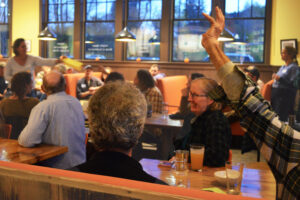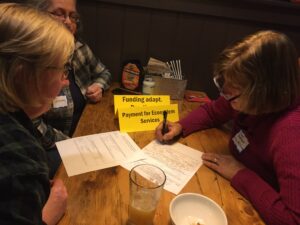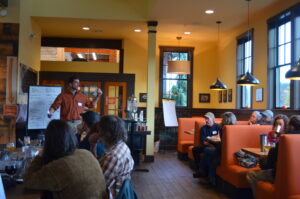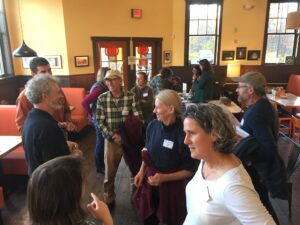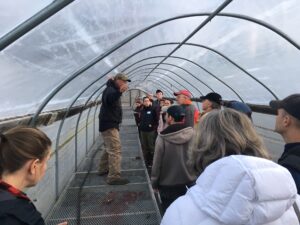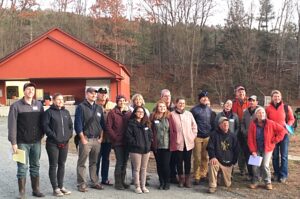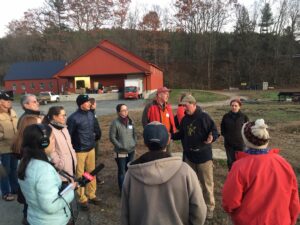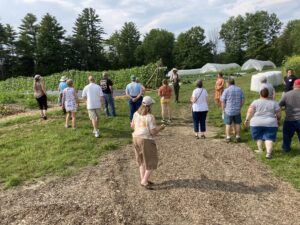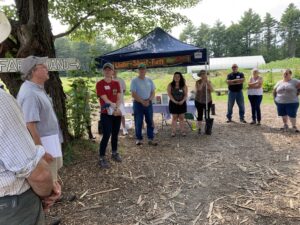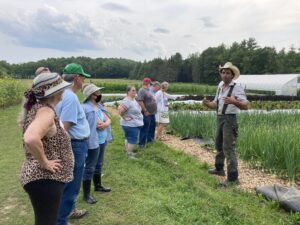Final report for ONE19-348
Project Information
Climate disruption is a growing threat to Upper Valley food producers and the communities that rely on them. Supporting farms to increase their knowledge and implementation of mitigation and adaptation practices was hoped to be achieved through building a farmer network that leverages the power of a peer relationships and networks. The in-person farmer gathering at the launch of this project demonstrated the eagerness of farmers to learn and support each other as they navigate a changing climate that was having increasingly negative impacts on their land and businesses. An initial survey of farmers showed that there was interest in learning about conservation activities, but that farmers didn't have the resources (time, money, expertise) to take action on their farms. Farmer's collaborated on developing a plan of activities and resources that could aid them in their adoption of conservation practices that included on-farm demonstrations and workshops, schemes for getting community financial support, and equipment sharing. Then the pandemic hit.
We were able to host several events during the course of this project, but the pandemic resulted in adjusting our plans and expectations for building a peer network that would meaningfully support increased farmer adoption of climate-smart practice. Farmers couldn't physically join together for on-farm demos, while the stresses of life during the resulting economic crisis required flexibility in how we supported the development of a climate farmer network. With significant limitation on farmers time and attention, we pivoted to providing a consistent flow of information and resources through email blasts and e-newsletters. The development of an online Adaptation and Mitigation Resources toolkit collected the most current information and resources for farmers in the region to reference as they consider transitioning production practices or dealing with the impacts of the changing climate on their farms.
A robust farmer network was not created during this project due to the reasons stated above, but an unexpected network of community-based local food action groups, that includes farmers, was built in response to the impacts of the pandemic and the increasing awareness that climate disruptions to our food system are already happening and are increasing in frequency and severity. A more community-centric network to support farms and community climate resilience developed and continues to grow in our region. These grassroots group often center their efforts on food security, of which local farmers are a key participant.
With the increasing urgency for farms to adopt more conservation practices, a recent survey of Upper Valley farmers identified the top three barriers preventing or slowing down their progress in implementing climate-smart practices include not having the labor to change production practices, not being able to afford the equipment or supplies, and not knowing what they should be doing. With the increased awareness of the importance of farms to rapidly adopt conservation practices and the knowledge of what their challenges are in taking action, communities can target resources and support strategically to help farms adapt and mitigate more quickly to meet this pressing crisis.
There is significant expertise among our farmer base and we have cultivated a culture of convening and sharing. This project seeks to directly assist approximately 35 farmers in adapting their farm practices to climate instability through education, awareness-building, technical assistance, and peer support. They will also be coached to take a leadership role in securing our region’s food supply by creating food system resiliency in their communities. An additional 75 farmers will benefit from by-products of the project: powerpoints, reports, and other residual materials online. Objectives include
- Building a community of farmers focused on sharing knowledge, equipment, production, or other resources needed for the coming decades;
- Providing a central clearinghouse to make relevant resources continuously available to Upper Valley producers;
- Collaborating with farmers to develop a convening format that accommodates their busy schedules, including content they find practical and relevant;
- Facilitating individual farms and/or the group as a whole in identifying gaps in resources needed over the short term to meet their farm and community goals related to climate change.
Our project will engage state and regional research and experts, within the context of local relationships. Vital Communities has worked with producers in small-group settings for decades, most recently convening three themed producer groups: farm businesses invested in shared food facilities, on-farm employee education, and small-group peer-to-peer learning. Producers trust us to identify and share resources, and are interested in building community around this topic. Our region is home to significant climate expertise on both sides of the Connecticut River, all of which will benefit producers.
The State of Vermont (climatechange.vermont.gov) predicts both threats, such as heat stress on livestock and a steady decline in maple sugar production, and opportunities, presented by an extended growing season and milder winters. University of Vermont’s (UVM) extension service has a Farming & Climate Change Program (www.uvm.edu/extension/sustainableagriculture/farming-climate-change-program), part of its Center for Sustainable Agriculture, with a fulltime Farming & Climate Change Coordinator on staff. Videos on the website showcase New England farmers, including Edgewater Farm and Vermont’s Intervale, who are already experimenting with new crops and practices adapted to changing hardiness zones.
New Hampshire, on the other hand, is highly focused on fisheries and coastal weather events. Agriculture topics on the University of New Hampshire (UNH) extension service website (extension.unh.edu/topics/agriculture-horticulture) mention climate change only incidentally, all the more reason for regional programs like ours to assist our region’s New Hampshire farmers in understanding and preparing for climate adaptation.
Since 2017, Vital Communities has taken on the Upper Valley Adaptation Workgroup as a new program. (UVAW, vitalcommunities.org/adaptation). UVAW is a coalition of leaders from relevant stakeholder groups focused on building climate resilient communities in our region. Our project will leverage their expertise, both states’ extension services, and the USDA Northeast Climate Hub.
Our project also draws on two other sources. A 2013-14 study of 15 Vermont farmers after Tropical Storm Irene conducted by Dr. Rachel Schattman, a USDA Northeast Climate Hub researcher for the University of Vermont indicated that farm response to climate change was based largely on personal experience with extreme weather, especially flooding. Her recommendation that farmers share adaptive practices is reflected in the SARE-funded 2017-18 New England Adaptation Survey for Vegetable and Fruit Growers, a UVM survey of 193 growers across the region. Farmers’ top preference for “the best source of information and adaptive approaches to new challenges” was other farmers (88%), followed by university extension (62%), conferences (59%), personal experience and innovation (53%), and 17 other choices (p. 19).
Of the survey’s 193 respondents, 66 were from Vermont and 28 from New Hampshire. We contacted project researcher Alissa White for more detailed information on the ten who responded from the four counties comprising the bulk of our region (0 Sullivan Co, NH; 2 Grafton Co, NH, 5 Orange Co, VT; 3 Windsor Co, VT). The mere fact that there were so few Upper Valley respondents evidences the need for outreach and education. Upper Valley respondents farmed an average of 16.5 acres, 6.4 in organic production. All but two were beginning farmers with less than ten years experience. Half were female and the average age was 45.
Practices already in use to mitigate increased precipitation were many and varied. Six farmers (all Vermont) were already using 10 to 18 of 30 suggested practices, the rest two to nine. Their top five concerns, in descending order, were reduced snow cover, increased disease and fungus, unpredictable spring temperatures, increased insect and pest threats, and loss of nutrients due to precipitation. Nearly all agreed (mean score: 4.8 of a possible 5) that “increased intensity of droughts, storms, and floods is a result of climate change,” and that their farmland “was vulnerable to extreme weather conditions” (4 of 5). Their confidence that “community and social networks will support my farm in recovering from severe impacts… including crop insurance” scored 2.9 of 5, possibly because none had water management insurance. (Nor had any conducted financial analysis and planning for climate adaptation, indicating likely topics for our project.)
Finally, Upper Valley respondents agreed with their New England peers (67%) that grants would be the incentive/resource most helpful in making changes needed to manage climate disruption. However, they deviated by ranking demonstrations equal to grants, while New England growers as a whole ranked demonstrations fifth of six choices. Following grants and demonstrations, Upper Valley farmers ranked the remaining choices in descending order: technical assistance and equipment access (tied for second place), followed by cost shares and Other Resources, which elicited two responses: education and one-on-one advice.
Cooperators
Research
2019
The Farmer Climate Network kick off event in October 2019 attracted 21 farmers for a presentation by Josha Faulker, UVM Farming and Climate Change Program Coordinator. Dr. Faulkner shared climate trends and projections for Vermont and the region and the resulting impacts for farms and our food system. Farmers shared how they are being impacted and how they are mitigating and adapting for climate.
Farmers participated in a group activity to design future network educational events and creative solutions to current and looming challenges. Farmers formed 8 groups according to topics they would like more information about/training on/resources invested in and then the group, by consensus, designed the types of activities they would find useful and attend. The information gathered from the groups included the type of event (webinar, workshop, online reading, etc), goal for event, time of year, location, and possible presenters. A few examples:
- No-till education with a workshop/conference component in the winter along with an on-farm demonstration in the summer
- Regional resilience by limiting farm inputs with webinars with expert presenters and online reading and resources
- Water management workshop to better understand erosion control, drainage, and irrigation systems
In November 2019 Edgewater Farm hosted 16 people, including 4 farmers and 3 service providers. The event started with a presentation by Chris Skoglund from the NH Department of Environmental Services “Preparing Local Food Systems for Climate Change”. Pooh Sprague (Edgewater Farm owner) shared his experiences farming in a changing climate and we toured the farm to learn about the adaptation practices the farm has implemented over the past several years.
2020
We collaborated with the Connecticut River Farmer Watershed Alliance to host an in-person event "Payment for Ecosystem Services Presentation". The event attracted 25 participants including 16 farmers, UVM Ext. and NRCS staff and included break out sessions to get input on how a PES system could work in Vermont.
In February 2020 we also hosted a two-part workshop with "Renewable Energy Funding for Farms and Small Businesses" in collaboration with Rural Development with the goal of providing the information and resources needed to move forward with a renewable or energy efficiency project. The series included a webinar overview of the Renewable Energy for America Program (REAP) and an in-person workshop with The Rural Development Energy Coordinator for Vermont and New Hampshire, a farmer and solar installer who recently completed a REAP project, and Vital Communities' Climate Projects Coordinator. Three farmers attended both sessions and Eight farmers attended either the webinar or the workshop. Session recordings, and energy efficiency and renewable energy resources were shared with all event attendees and shared with 140 farmers via email.
We were in the midst of planning a six-part in-person community educational series "Climate and Community Resilience: Lessons from the Soil" for the spring when COVID-19 required the transition to virtual events. This free series was in collaboration with many partners including Vermont Healthy Soils Coalition. The series ran from late March to mid-May with the following sessions:
Earth’s Cycles: Foundations of Energy and Matter, Historical Landscape: Learning from the Past, Here and Now: Human Impacts, Systems Collapse: Climate and Ecological Crisis, Revolutionary Resilience: Creating a Different Future, Fertile Ground: Reclaiming Power and Possibility
This workshop series was open to the public and highly promoted to farmers as the content focused on soil health in increasing climate resilience. The final session included a panel with five farmers sharing how they are adapting to climate change and/or farming with regenerative practices. Each session included time for breakout conversations among attendees to build relationships and community around climate resilience. The virtual logistics for this series made it difficult to report how many farmers participated in this series, but we approximate at least 12 farmers attended at least one of the sessions. Recordings of the entire workshop series were shared with 143 farms via email.
In October and November 2020 we hosted three virtual events "Resilience Through Local Food Security" in the New Hampshire communities of Lebanon/Mascoma Valley, the Kearsarge region, and Claremont/Newport. The pandemic has highlighted the critical importance of local farms and working lands and these events included hearing farmer stories about their land challenges and successes as they stepped up to feed our community during the past year and land access technical assistance from project collaborator, Land for Good. The goal of the series was to build community and facilitate connections that increase resilience through local food production and working lands in these three micro-regions in New Hampshire. The Lebanon/Mascoma Valley event included stories from a local dairy and attracted five farmers. The Kearsarge event focused on stories about farmers working with the community to make sure that neighbors weren't hungry during the early days of the pandemic and included six farmers. The Claremont/Newport conversation focused increasing working lands through conversation and had five farmers participate. We followed up the sessions with land access resources and technical support for farmers and community resilience building resources for all.
2021
Another year of pandemic in-person event restrictions and general economic uncertainty resulted in another challenging year and an adaptation. The focus on hyper-local connections and solutions to food system challenges and climate change resilience along with the organic growth of grassroots food resilience groups in our region, led to the creation of a new network- Upper Valley Resilience Network.
There was strong interest from farmers and other community food resilience groups in building a network for communication, resource sharing, and relationship building. We hosted three virtual convenings during the non-growing season that attracted much interest from farmers, grassroots food action/resilience committees, agriculture service providers, other and food system stakeholders. Network members are all food system stakeholders (food access, community gardens, farm businesses, Ag service providers) working to increase local food system resilience in the face of climate change. Sub-regional and town groups shared resources, projects, and planned for building capacity at the hyper-local level while strengthening a network that can learn from and support each other. This hyper-local approach is in response to the pandemic isolation yet will be critical in preparing the Upper Valley food system for the impacts of climate change.
We were able to host one in-person workshop in August at Winter Street Farm in Claremont, New Hampshire- “Land Access and No-Till Farming”. Winter Street Farm is a small certified organic CSA farm that was in its third year of operation and has been experimenting with no-till vegetable production. The Saturday afternoon event included a conversation about creative ways to access land as a new farmer and a tour of their no-till diversified farm. 21 people attended the workshop, including 12 farmers. Winter Street demonstrated their experimentation with no-till vegetable farming, sharing successes and failures.
An Online Toolkit: Climate Adaptation and Mitigation on the Farm was created to share information and resources about climate-smart practices, reports, studies, maps, and farmer support programs. The toolkit was initially created in 2020, but not fully executed until March 2022 due to a website rebuild and pandemic delays. The toolkit was officially launched in March 2022 and was shared with farmers via email blast, list-serv posts, farmer enews promotion and by sharing with service provider partners. Since the toolkit has only been live for a short time, there are not adequate pageview analytics, but one farmer sent an email specifically to share this review "I want to congratulate you on the fantastic job on putting together the resource page on the website for climate resilience for farmers. It lists a tremendous amount of information and is thoughtfully laid out to be compelling reading and easy to find information."
Awareness of the importance of climate-smart and regenerative agriculture has increased dramatically during this project. Two collaborations that have developed in an effort to build a climate farmer network that includes Ag service providers and educators are:
- Regeneration Corp partnership- In 2021 Vital Communities joined as a partner in Regeneration Corps, a learning collaborative that connects youth with learning opportunities about regenerative agriculture and social justice. Several Upper Valley regenerative farms are Corps partners and host area high school students in on-farm activities that support increased understanding and implementation of regenerative production practices.
- Southeast Regional Vermont Agricultural Water Quality Partnership has a goal to build awareness of and network relationships with the many area service providers that are working with farms to improve their environmental practices while increasing farm viability. This coordinated effort will increase the efficiency and adoption speed of conservation practices by area farms.
The project had a strong kick-off event in the fall of 2019, with 21 farmers attending an event and excitement planning activities for the Climate Farmer Network. We squeezed in a farm tour and solar workshop before COVID 19 required a pause in the project in March 2020. The inability to gather together safely plus the lack of bandwidth of most farmers, who were stressed with adapting to losing or gaining sales channels, developing online stores, developing safety protocols for their farms, remote schooling family challenges, etc. required us to pivot to providing resources and information through email updates plus a series of Zoom-based events for the rest of 2020 and into the summer of 2021.
It was challenging to build a network without being able to gather in-person and it was hard to get the attention of farmers during such a stressful time. In the summer of 2021 we were able to host one gathering to tour a farm, but much of the energy and interest from farm partners was being directed to hyper local food and community resilience efforts. The pandemic demonstrated the importance of farms to our communities- economically and socially and their ability to withstand the impacts of climate change and even positively effect it through their practices also became important to community members. At the same time, a drastic increase in awareness, resources, and information around implementing climate-friendly practices seemed to be everywhere, so there was an abundance of information that we shared with our farmers, even though we couldn't meet in person.
Anecdotal information from farm partner about what was preventing them from implementing more practices led us to develop a project proposal to provide grants/incentives to farms for adopting climate-smart practices along with technical support from a collaborating TA provider. The project wasn't funded, but it gave us a chance to learn where farmers were in 2022 and what they need most to adopt conservation practices. Peer learning continues to be an important aspect, so we will be hosting a series of twilight farm tours this summer for a cohort of "climate farmers". Technical assistance and grants to support implementation are also key resources that farmers say will help them transition their practices more quickly.
The goal of the project was to assist approximately 35 farmers in adopting climate adaptation/mitigation practices through education, awareness-building, technical assistance, and peer support. COVID 19 caused some real challenges at meeting our goals and developing a strong peer network of farmers. Health protocols and the demand on farmers and families during the pandemic resulted in far fewer peer events and opportunities to build the network and relationships. Also during the course of this project, awareness around the impacts of climate change and the urgency around and resources for taking action certainly grew due to the increasingly erratic and volatile weather patterns that negatively impacted farms. The the pandemic-related stresses on the food system laid bare the need for local farms as an importance player in developing more resilient communities and food system, so networks of farms and community food security advocates were created to address the impacts of the pandemic. We were able to support the grassroots farm and community-level groups that were not even in existence at the beginning of this project. The goal of creating a farmer-only peer group was thwarted by the pandemic, but hyper-local food system resilience action groups, which include farmers, was a surprising outcome. We also learn how we can support farms to more rapidly adopt conservation practices- through peer learning (now that it is safe to gather again), financial and community support, and technical assistance in making a conservation/resiliency plan.
Education & outreach activities and participation summary
Participation summary:
Consultants:
Joshua Faulkner (UVM Farming & Climate Change Program Coordinator)- presented at event and provided many connections to folks working in the Ag/climate realm and other resources.
Alissa White (UVM Fellow)- provided data on implementation of adaptation and mitigation practices among farmers and emerging resources for farmers.
Laura Johnson (UVM Extension and CT River Farmer Watershed Alliance coordinator)- Pollinator and biodiversity information.
Jeremy DeLisle and Olivia Saunders (UNH Cooperative Extension)- technologies and techniques for conserving water while irrigating crops.
Ken Yearman (Rural Development Energy Coordinator for VT & NH)- Solar subsidy programs for farms.
Cat Buxton- Grow More, Waste Less- Soil health expert that presented at events and provided resources on building healthy soil.
Olivia Saunders (UNH Extension Field Agent) - Climate assessments for farms
Tours:
Edgewater Farm, 2019
Winter Street Farm, 2020
Webinars, Talks, Presentations:
October 2019, Farmer Climate Network Kick-off
February 2020, Payment for Ecosystem Services farmer input event
February 2020, Renewable Energy Funding for Farmers- a 2 part event
March-May 2020, Soil Health a 6 part virtual series
October-November 2020, Resilience Through Food Security- 3 virtual events
February- April 2021, Upper Valley Resilience Network 3 virtual convenings
Online Toolkit can be found on the Vital Communities website at https://vitalcommunities.org/climate-adaptation-and-mitigation-on-the-farm/.
Learning Outcomes
An initial questionaire of the 22 farmers that attended the network kick off event in the fall of 2019 reported that 100% have already experienced the impacts of climate change on their farm. 91% had been impacted by increased flooding and erosion issues, 82% reported increased pest and disease issues and drought stresses. Heat stress impacted 77%. Other impacts reported include nutrient management issues, and increase crop failures or product loss. Five farmers reported that they were implementing some mitigation/adaption practices, four have a plan to implement next season, and eleven farmers are not adapting to climate change and don't have a plan. When asked what resources they were lacking to implement climate practices, 91% reported that bandwidth and money were the key reasons that have not been adapting to climate. More than 85% said they can't afford the supplies or equipment and that they can't financially risk changing their current production systems.
An evaluative survey of network farmers was completed in Spring 2022 that identified areas of increased knowledge and awareness, and where there are still gaps in knowledge and resources. 27 farmers responded and 100% reported that they had gained knowledge/awareness/skill about about climate impacts and action since 2019. 89% reported that they are experiencing the impacts of climate change on their farms, with 55% experiencing flooding and/or droughts, 50% seeing heat stress on crops/animals, and 46% seeing increased pest issues. Other impacts reported include erosion, nutrient issues, increased crop loss, and water supply issues. 30% of farmers said they were implementing many adaptation/mitigation practices and 54% reported that they were implementing some practices - a significant increase from the initial survey. Climate impacts have been accelerating quickly over the course of this project and awareness of the crisis and the urgency for action has been a big factor in the increased adoption of these practices with farmers. When asked what resources they were lacking to implement more climate practices: 38% don't have the labor to change production practices, 33% can't afford the equipment/supplies, 29% are not sure how to change, 17% don't have the time to change practices, and 13% don't have the bandwidth. When asked what resources would help the, adopt more conservation practices: 71% subsidies/grants to support implementation, 42% on-farm demonstrations/farm tours to see what is working with their peers, 38% access to specialized tools/equipment through an equipment library, 33% increased market demand for climate-friendly products, 29% technical assistance for a conservation plan, 13% compilation of current science and innovation case studies.
We are in the midst of planning a series of twilight tours for farmer interested in learning what their peers are doing in regard to climate mitigation and adaptation practices. Farms in our region are experimenting with different approaches to increasing climate resilience and impacts: Carbon Management enterprise, a pledge to reduce carbon emissions by 10% every year, transitioning more acres to no or reduced tillage, focusing on ecosystem diversity and health.
Building a community of farmers during a pandemic was challenging since we could not gather together in-person and with how busy farmers were adjusting and pivoting to the volatile landscape of shifting market channels and increased interest in local food. Our execution of this project also pivoted to support to farms as best we could during this extremely challenging time by providing resources via e-blasts and one-on-one farmer assistance and outreach.
A pandemic silver-lining is that community and food system resilience has become a topic more people are cultivating at the hyper-local level. Farmers with a community are cooperating in ways they never used to (Honey Field Farm is hosting bi-weekly Pop-Up Markets this winter for dozens of vendors that lost a market channel when the Norwich Winter Market couldn't run due to COVID, many farmstands are now carrying lots of other farm's products). Community member are taking an active interest in their neighborhood farm and land conservation. This trend has led us to develop the Upper Valley Resilience Network to increase connection, information, and resources among the many grassroots efforts to positively impact food access and security, farm sustainability, and climate adaptation. Consistent communications channels along with an online clearinghouse/toolkit to share best practices/resources for farmers along with examples of how other towns/regions/food action groups are innovating and coordinating to increase climate resilience.
Project Outcomes
Awareness and urgency of the climate crisis broadly increased dramatically during the 2.5 years of this project along with farmer knowledge and resources. Community awareness and interest in the local food system has also increased during this time. This alignment has created an opportunity to make significant progress in farmer implementation of climate-smart farming practices with customer support and interest in farms that are "climate farmers"
Many farmers in our region are actively addressing their carbon inputs and their impact on the climate through various mitigation and adaptation practices. Sunrise Farm, a partner in this project, has built a carbon management facility on the farm that collects compost from the community and turns waste into compost that feeds the vegetables that he then sells to his community through CSA shares.
Luna Bleu Farm, a partner in this project, has joined with others in their 4 Town region (Sharon, Royalton, Stafford, Tunbridge) to expand the community garden and neighboring food shelf and create the White River Land Collaborative- an alternative model for land use that is leading the way in how communities can support working lands, young farmers, and social justice.
The pandemic has brought about collaboration and innovation in many realms, including our local food system. The networks that are being created now, like the UV Resilience Network are preparing us for future crisis.
Farms strengthen natural resources, bolster our self-sufficiency, and improve social and environmental resilience. In addition to increasing community resilience, they can be a powerful climate solution, but many farmers are short on time, labor, and bandwidth to make needed changes. Providing the resources needed to encourage, incentivize, and support farmers' rapid adoption of climate adaptation and mitigation practices is critical and there is not one silver bullet- it will require strong peer networks, financial and community support, and technical assistance. With the information gained during this project, Vital Communities is continuing to convene a farmer peer network in collaboration with NOFA VT focused on climate practices and collaborating with other Ag service providers to develop a project that provides meaningful financial support in tandem with conservation technical assistance to accelerate implementation of climate adaptation/mitigation practices in the Upper Valley.
